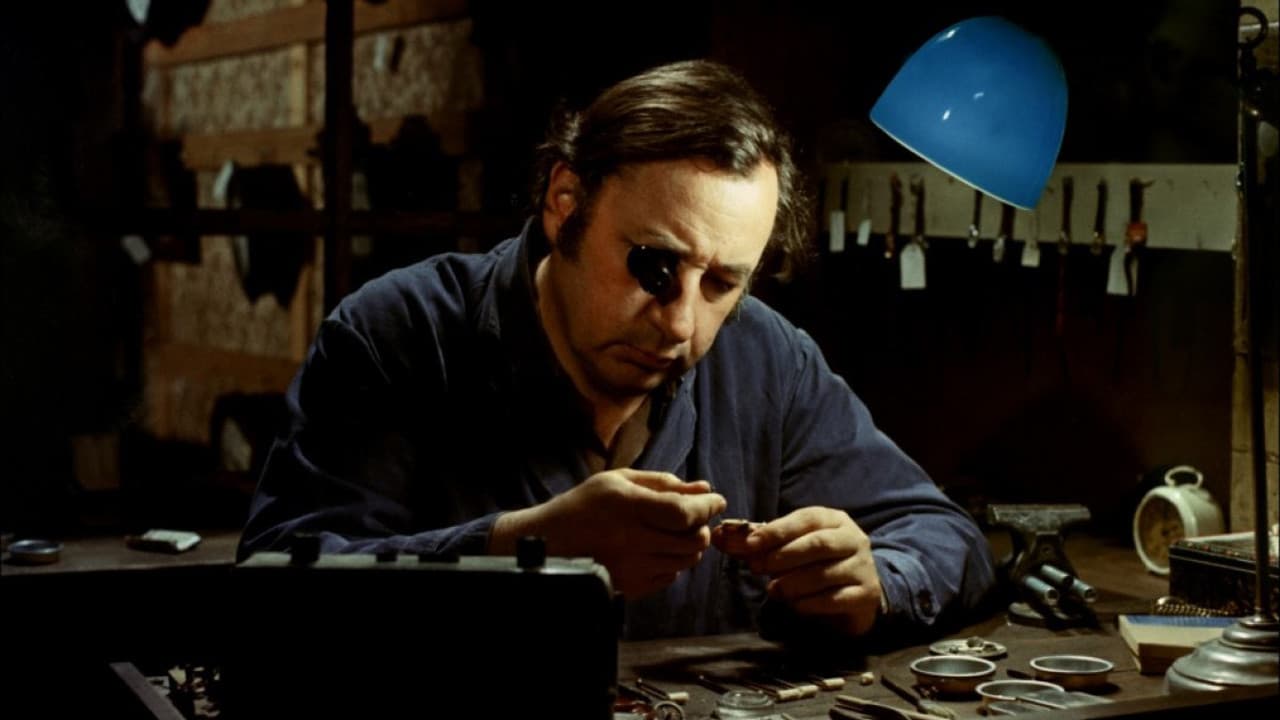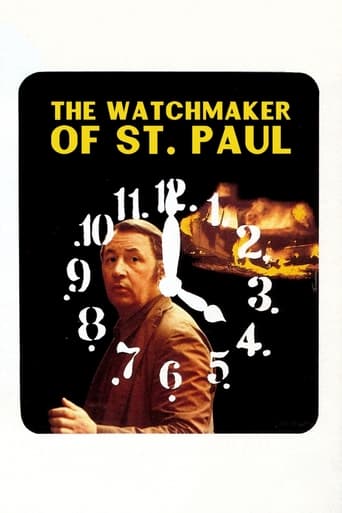

"Your son killed a man...We don't know why." The cause of the movie is the murder. The purpose of the movie is to look closely at Michel Descombes, the father. The Clockmaker (l'Horloger de Saint-Paul) is not a murder mystery. Were it not for the skills of Bertrand Tavernier and his frequent lead actor, Philippe Noiret, we might be in for a long, introspective slog full of what it means to be a solitary human being. With these two, and with Jean Rochefort as Inspector Guilboud, we have a movie that explores loneliness, friendship and, eventually, understanding with a good deal of depth and style. Descombes is a self-contained man, friendly enough, probably what he thought of as a reasonably good parent, but not an especially happy man. "You're a widower?" a policeman asks. "No, not exactly," he says. "We were already separated. I guess I am a widower. I was just as miserable as one." Descombes struggles to understand his young son. Inspector Guilboud struggles to understand the son's motive, and then to understand the father. The more they learn, however, the more the fact of the matter stays the same; the son murdered a man. "I killed him because he was filth," Bernard Descombes eventually declares. Guilboud finds some empathy with Descombes. Even so, Descombes' son will be caught. "France is a funny country," Guilboud says. "Fifty-million inhabitants, twenty million informants." Descombes' son seems to represent more than just another murderer to Guilboud, a man with his own issues. He may see something of himself in Descombes. It is Descombes, however, who has to make the hardest journey, to try to understand who is son is. The Clockmaker turns out to be one of the most interesting of the collaborations between Tavernier and Noiret, even with the now dull political subtext of complacent and suffocating French society. Still, the movie was made in 1974, an uneasy period. The movie finds itself, however, and the last twenty minutes are powerful minutes. "I stand by my son...in complete solidarity." Without Noiret, this movie would not have worked at all well, in my opinion. With Noiret and Rochefort, it works very well. Other films by Tavernier and starring Noiret that I recommend with enthusiasm include Coup de Torchon - Criterion Collection (a marvelous black comedy), Revenge of the Musketeers and Life and Nothing But.
... View Morei like the smell of the street of Lyon , I like the small towns of France's 70's ,that's why i also like Montpelier in"deux hommes dans la ville" ..Cécile Vassort who was in both movies is a perfect small town girl for me tavernier who was appointed as the director of this film apparently was influenced by his teacher jean Pierre Melville who also had a great sense of cities's street , the difference is Melville prefers big cities, Paris, marseille, new york , Chicago, etc. when Melville smells the dark crime of big cities, tavernier smells the fresh life of small towns ,another difference if you ask me...here i also want to mention another director Pierre granier deferre who usually smells very small villages instead of cities or towns. so he made decent fils , such as Veuve Couderc, La (1971) Horse, La (1970) Fils, Le (1973)
... View More"The Clockmaker" is a minor classic... so great, in fact, that nobody seems to know what to do with it. Why? Perhaps it doesn't fit neatly enough into the crime genre. The first shots are provocative: A child looks out from a train at a burning car. As the opening titles hit the screen, the music crescendoes. We know something bad has just happened; we brace ourselves for the violence to come. The cinematography here has the hard-hitting feel of exposé cinema (e.g., Costa-Gavras' `Z'.) As if leaving its promise unfulfilled, however, this is the film's most dramatic moment. The only violence, as it were, has occurred before the action director Bertrand Tavernier shows us. Much like its principal characters, we are left to contemplate what happened and WHY it took place.The story is simple enough. Monsieur Decombes, a clockmaker, is interrupted at work by the local police. They inform him that his abandoned car was found by the side of the road, left there by Bernard, his son. Would he accompany them to go see it? Under this pretext, they bring him to the station, where he meets a mysteriously evasive Inspector Guilboud. They return to the vehicle together. Only then does the inspector confront him with the awful truth: Bernard and his girlfriend have killed a man. Decombes is shocked. How could his boy have done it? Throughout the rest of the film, he struggles to understand this hideous crime and his relationship with Bernard, ultimately left with more questions than answers.Mainstream moviegoers find "The Clockmaker" boring and anticlimactic. They're used to seeing crime flicks with action and plot twists. Here, they know the identity of the murderer from the start, they never see a dead body or an exciting arrest, and 90% of the focus is on the criminal's father. What they're left with is an hour and a half of wayward wanderings... of "character development." What could be more pedestrian? One almost gets the sense that this was the very reason that Tavernier chose to bring Georges Simenon's book to the screen: It's structure is a full inversion of what audiences are used to. This is a point that deserves to be revisited later, as it has a great deal to do with the deeper meanings of this work.While it won the Prix Louis Delluc, `The Clockmaker' has never been taken seriously by arthouse snobs either. They call its direction `heavy-handed.' They note the over-the-top performances of Philippe Noiret and Jacques Denis (not to mention Yves Afonso. runner-up to Alain Delon in the "too-cool-for-words" competition.) Oddly, they call it `commercial'... a conventional social melodrama. And while it isn't Hollywood melodrama of the Douglas Sirk or Nicholas Ray varieties, there is some validity in this assertion. The definition of `melodrama' describes the film well: `A composition. intended to exhibit a picture of human life, or to depict a series of grave or humorous actions of more than ordinary interest, tending toward some striking result.' And the point of the film is all-too-obvious: Love isn't clockwork.I've heard `The Clockmaker' compared to many films, including those of the French New Wave that preceded it. Is there any similarity, though, between Tavernier's work and such melodramas as. say. Godard's `Vivre sa vie' or Truffaut's `The Soft Skin'? There isn't. Some have suggested that the film was the model for `The Sweet Hereafter', in that both deal with isolation and the loss of children. Yet, where Egoyan's film is politically neutral to the point of nihilism, `The Clockmaker' outlines a specific set of social conditions that made murder an inevitability. The factory watchman is the avatar for all social-climbing capitalists. abusing his authority toward lecherous ends. Liliane, Bernard's girlfriend, is the powerless victim. Whether or not Bernard pulled the trigger is immaterial. In effect, society has handed him the gun, cocked and loaded.Personally, I find the film more similar to the work of the New German Cinema. particularly Fassbinder's `Mother Küsters Goes to Heaven.' Both films begin just after murders have been committed. Both films spotlight those who are left behind to deal with loved ones' unspeakable acts. Both films give us radicals and reactionaries, each determined to use the protagonists' woes to political advantage. Ultimately, `The Clockmaker' is the more profound work of the two. It is a true `slice of life' and not the stagy drama that `Mütter Küsters' is. Starting from a conservative stance in its opening scene, in which Decombes and his friends discuss the merits of capital punishment, it turns out to be a liberal piece. Its point, as I see it, is not merely that 'violence begets violence.' True love, in Tavernier's paradigm, comes not from hearing but from listening. not from validation but from understanding. not from making things run like clockwork but from accepting the bumps in the road as part of the journey.
... View MoreThis film is a brilliant portrayal of a man caught between his private memories of a fugitive son and the political interpretations of his son's actions. There is a constant interplay between Michel Descombes's private existence, individualized profession (as an artisan, he is necessarily the opposite of a mass producer), and the public spectacle that his son has become. It is truly a fascinating commentary on subversion and freedom, wonderfully played by Noiret and other greats, that provides incredible emotional depth.
... View More